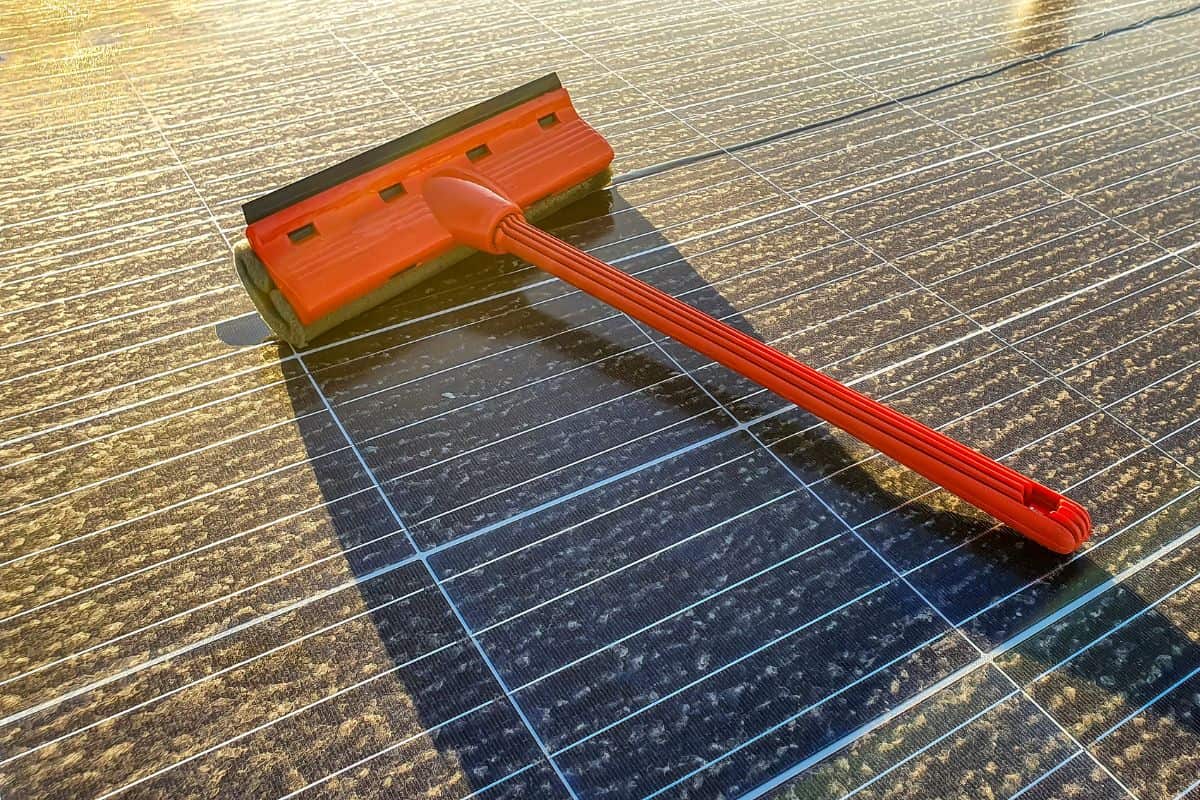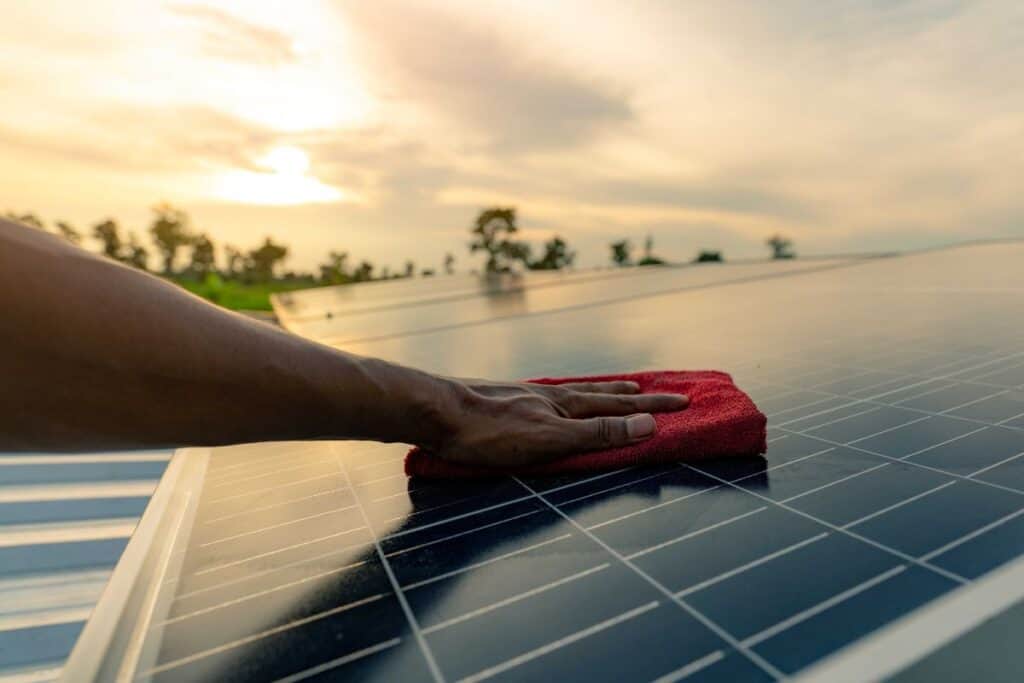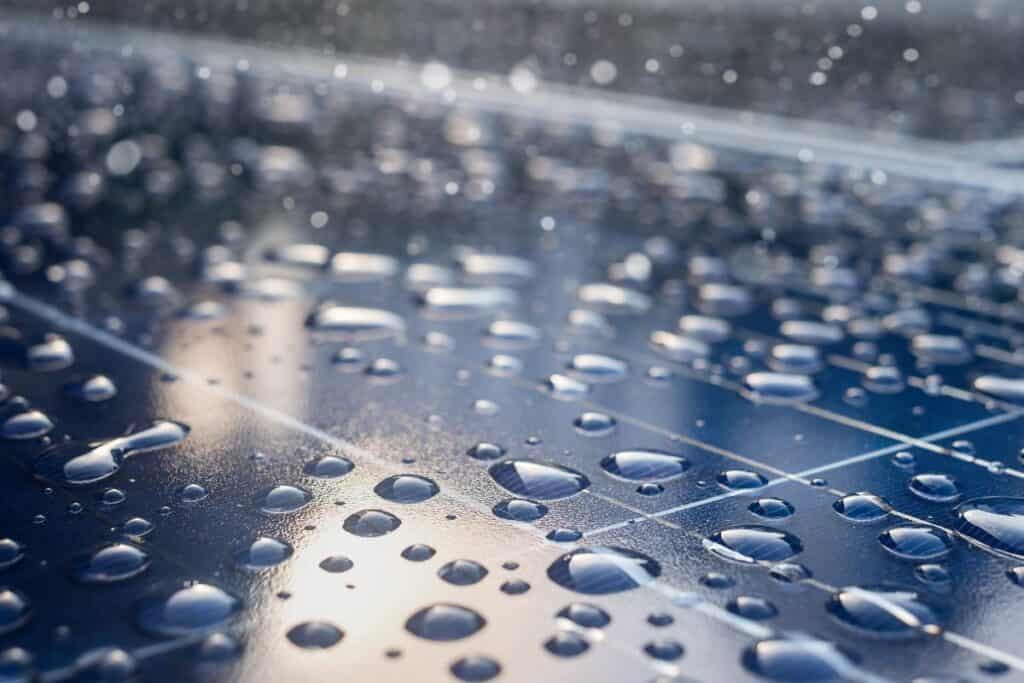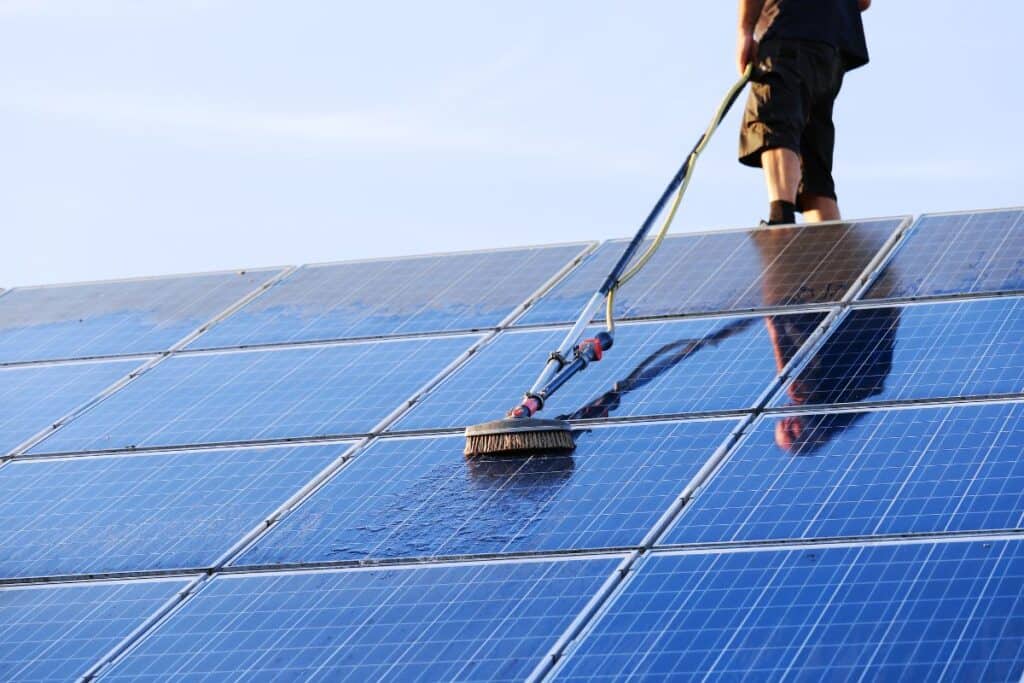If you’ve taken the green leap and installed solar panels, you’re probably wondering about maintenance. After all, they’re exposed to the elements day in, day out.
One question that often comes up is: Do solar panels need cleaning? Well, let’s shine a light on this topic and get to the heart of the matter…
Yes, solar panels do need cleaning. While they are designed to withstand weather and outdoor conditions, over time they can accumulate dust, dirt, bird droppings, leaves, and other debris. This layer of grime can reduce the amount of sunlight that reaches the photovoltaic cells in the panels, which can diminish their power production efficiency.
Now, let’s delve deeper into the topic and discuss when, why, and how you should clean your solar panels.

Understanding the need for cleaning starts with understanding how solar panels work. These panels convert sunlight into electricity. So, anything that limits the amount of sunlight reaching the panels can decrease their efficiency and, consequently, the amount of electricity they produce.
Dust, dirt, and bird droppings can form a layer over the surface of the panels, effectively creating a barrier between the sunlight and the photovoltaic cells.
The frequency and necessity of cleaning can depend on several factors.
If you live in a particularly dusty area or a place with heavy leaf fall, you might need to clean your panels more frequently.
The same goes for areas with a high level of air pollution or frequent bird activity.
Your solar panel’s angle also plays a significant role in how much cleaning it requires. Panels installed at an angle of 15 degrees or less may not self-clean effectively during rainfall and thus might require more regular maintenance.
The impact on power production may seem insignificant on a day-to-day basis, but over time, it can add up.
Studies have shown that dirty solar panels can lose between 5% to 25% of their energy output, and in some extreme cases, this can go up to 30%.
So, how should you go about cleaning your solar panels?
The good news is that it’s usually a straightforward process.
In most cases, hosing them down with water will be sufficient. For more stubborn grime, warm water and dish soap applied with a soft brush can do the trick.
It’s recommended to clean them early in the morning or late in the evening to avoid rapid temperature changes that can occur if they’re hot from sunlight exposure.
Some professional services specialize in solar panel cleaning, which could be a safer option, especially if your panels are roof-mounted.
Regularly monitoring your solar panels’ output will help you gauge when they need cleaning.
Remember, while cleanliness is essential, safety should always be your priority. If you’re uncomfortable or unsure about the cleaning process, don’t hesitate to reach out to a professional.
By keeping your solar panels clean, you’re ensuring they work at their best, giving you the most bang for your buck and contributing to a greener, more sustainable future.

The next question then is how often do your solar panels need to be cleaned?
Solar Panel Cleaning: How Often Is Ideal
Keeping your solar panels in tip-top shape is all about regular maintenance. Time to dust off the facts and get some clarity…
It is advised to clean them at least once or twice a year. However, depending on your local environment and weather conditions, you might need to do it more often.
The frequency of cleaning your solar panels can vary greatly, based on several factors.
Let’s uncover the specifics and identify the right cleaning schedule for your solar panels.
Solar panels are pretty resilient and designed to withstand various environmental conditions.
They’re exposed to rain, wind, snow, and dust, and in most cases, a good downpour is enough to wash away the accumulated dust and debris.
If you live in an area with regular rainfall, your panels might require less frequent manual cleaning. However, rainwater can sometimes leave residue behind, but more on that a little later in this article.
The local environment plays a big role in determining how often you should clean your solar panels.
If your panels are near a busy road or an industrial area where air pollution levels are high, they could accumulate dust and grime more rapidly.
Similarly, if you’re in a rural area with many birds or strong winds that can carry and deposit dirt and leaves, you might need to clean your panels more often.
The angle of your solar panels also impacts how often they need cleaning.
Panels that are tilted at an angle of 15 degrees or more tend to be more “self-cleaning” when it rains, compared to panels that are less tilted or flat.
So, if your panels have a lower tilt, they may require more frequent cleaning to maintain optimal performance.
While it’s important to keep your panels clean, it’s equally vital to ensure that cleaning is done safely and correctly.
High-pressure water can damage the panels, and abrasive or harsh chemical cleaners can scratch them, impairing their performance. When in doubt, consider hiring a professional cleaning service, particularly if the panels are high up or difficult to reach safely.
Monitoring your solar energy system’s output can also provide clues about when it’s time for a clean. If you notice a significant dip in energy production, it may be due to accumulated dirt on your panels.
Remember, regular cleaning is part of the package when you invest in solar energy.
By maintaining a suitable cleaning schedule, you can keep your panels performing at their peak and ensure that your investment in renewable energy continues to pay off.

Shower Power: Can Rain Effectively Clean Solar Panels?
A common question that comes to mind when we think about maintaining solar panels is “Do rain showers clean my solar panels?”
Well, let’s delve into it and see what happens when nature takes over the cleaning duty.
Yes, rain does have a cleaning effect on solar panels. While rainwater can remove dust and small debris, it struggles to deal with bird droppings, lichen, or stubborn dirt so it might not be as efficient as you’d think. Depending on the level of dirt or grime, you may still need to resort to manual cleaning methods.
Let’s dive deeper into the role of rain in keeping solar panels clean and when additional cleaning might be necessary.
Rain, in essence, is nature’s way of washing and cleaning.
It does a decent job in removing loose dust and light dirt from the solar panels. If your panels are installed at a steeper angle, the rainwater can more efficiently wash away the surface dust.
However, the efficiency of rain as a cleaning agent is dependent on the nature of the dirt.
As mentioned above, rainwater can remove dust and small debris, it struggles to deal with bird droppings, lichen, or stubborn dirt.
These require a more robust cleaning approach. Additionally, if you live in an area with infrequent rain or high levels of dust and air pollution, relying solely on rain to clean your panels might not be sufficient.
In regions with heavy rainfall and low air pollution, rain can help maintain the cleanliness of the solar panels to a significant extent.
However, it’s always a good idea to inspect your panels periodically. If they appear dirty or your system’s efficiency has dropped, a professional cleaning may be needed.
In a nutshell, while rain can contribute to keeping your solar panels clean, it shouldn’t be the only method relied upon.
Regular checks and timely manual cleaning ensure that your solar panels continue to function at their maximum capacity, thereby providing you with sustainable and cost-efficient energy.
Let’s now look at the best way to clean your solar panels…
Steps to Safely Clean Your Solar Panels
While professional cleaning services are always an option, basic cleaning tasks can be performed yourself with the right precautions and tools. However, always remember that safety is paramount.
Ready to get started? Let’s dive in to look at the process of solar panel cleaning.
Step one in cleaning your solar panels is safety. These panels are typically located on rooftops, so ensure you have proper safety gear. If your panels are too high or your roof too steep, consider hiring a professional cleaning service.

Before you start cleaning, check your solar panel manufacturer’s guidelines. Some manufacturers may have specific cleaning instructions or restrictions, and not following these could void your warranty.
The general advice is to clean early morning or late evening when the panels are cool to avoid cracking the glass from sudden temperature changes.
Most of the time, a good rinse with a garden hose is enough to clean the panels. Use a soft brush with a long handle and soap water for stubborn dirt or bird droppings, but avoid hard or abrasive brushes that can scratch the panels.
Take note that solar panels are covered with a protective glass coating, so use gentle, circular motions when brushing to avoid causing damage. After brushing, rinse the panels again with clean water.
If your area has hard water, consider using a squeegee to remove water after rinsing to avoid mineral deposit build-up. Alternatively, you can use deionized or distilled water.
In summary, solar panel cleaning is a straightforward task that you can do, provided you take the necessary precautions and follow the manufacturer’s instructions.
Just remember, when in doubt or faced with a risky situation, always call in the professionals. The goal is clean panels, but safety should never be compromised!
Smart Solutions: Products to Keep Your Solar Panels Clean
Something I asked when I first installed solar at home was whether or not there were any products out there that can help keep my solar panels clean for longer.
This question is quite common among solar panel owners, and it’s definitely worth discussing.
Let’s explore some of the products that can help keep your solar panels pristine and efficient.
Utilizing specific products could indeed extend the cleanliness and, by extension, the effectiveness of your solar panels. However, it’s crucial to use only products safe for your panels.
Nano-coatings are emerging as a popular choice among solar panel owners.
These are hydrophobic solutions that can be applied to the surface of your panels.
Once applied, they help reduce the accumulation of dust and other particles on the panel’s surface.
Additionally, when it does rain, these coatings encourage the water to sheet off the panels, taking any accumulated dirt with it.
A popular example is a product called Nanolex, but always remember to check with your solar panel manufacturer before application.
Aside from nano-coatings, automated cleaning systems, similar to sprinkler systems, can be installed for large solar panel arrays.
These systems periodically spray water or specific cleaning solutions on the panels to keep them clean.
They are especially useful in arid areas where dust accumulation is rapid. However, these systems can be expensive and may not be suitable for smaller residential installations.
Furthermore, you can also use cleaning kits specifically designed for solar panels. These kits usually come with a biodegradable soap, a wiper, and a long handle brush.
Remember, any cleaning solution used should be eco-friendly and non-abrasive to prevent damage to the panels.
There are various products available in the market that can help maintain the cleanliness of your solar panels but it’s always important to check with your manufacturer or a solar professional before using any product to ensure it won’t damage your panels or void any warranties.
Keeping your panels clean will help maximize their energy production and save you more money in the long run.
